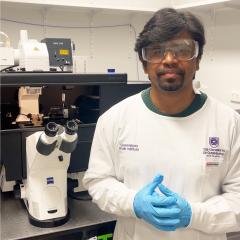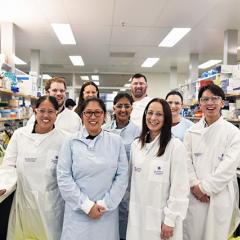A promising treatment for inflammatory bowel disease and a pre-clinical drug candidate for a devastating neurological condition are among four University of Queensland (UQ) research projects to receive support from Australia’s national biotech incubator - CUREator.
Researchers partnering with UQ’s commercialisation company UniQuest have secured $2 million to establish two startup companies and progress two projects focused on health security under the Medical Research Future Fund (MRFF)’s national $40 million Brandon BioCatalyst-run CUREator incubator.
UniQuest CEO Dr Dean Moss said the funding recognised UniQuest’s trail-blazing role as a university technology transfer hub dedicated to commercialising biomedical research.
“This funding demonstrates the depth and breadth of UQ research and its potential to make a tangible difference, be it as a new drug, vaccine or treatment,” Dr Moss said.
“UniQuest is proud to support the exceptionally high-quality and innovative research from UQ’s Institutes and Faculties and the hard work and dedication of the scientists and clinicians who are focussed on bringing new ideas and treatments to life.”
The UQ startup projects awarded funding are:
- Micromune Therapeutics, a startup aiming to develop a small molecule therapeutic for inflammatory bowel disease derived from the microbiome. This builds on research by Mater Research Institute-UQ Associate Professor Jakob Begun and UQ’s Institute for Molecular Bioscience’s Professor Rob Capon.
- Sycura Therapeutics, a startup aiming to evaluate a first-in-class brain penetrant small molecule as a preclinical candidate for amyotrophic lateral sclerosis (ALS). This builds on research at UniQuest’s small molecule drug discovery and development group, the Queensland Emory Drug Discovery Initiative (QEDDI) as well as research by Dr Richard Gordon from UQ Centre for Clinical Research.
Micromune scientific cofounder, Dr Begun said he was driven by his patients’ needs to address all aspects of their inflammatory bowel disease (IBD).
“Advanced therapeutic options to treat IBD are relatively expensive, with significant safety concerns, and relatively high rates of treatment failure,” Dr Begun said.
“We have identified a compound produced by probiotic bacteria with anti-inflammatory activity in pre-clinical models of IBD.
“The opportunity to progress this promising preclinical research as a new therapeutic targeting a novel pathway for IBD is a significant step,” Dr Begun said.
Head of QEDDI Dr Brian Dymock said that there is a desperate need for new disease-modifying treatments for motor neurone disease.
“QEDDI has discovered a novel molecule that can enter the brain and block neuroinflammation, potentially a new way to treat neurodegenerative diseases.”
“CUREator funding presents an exciting opportunity to explore the impact of this new mechanism on this devastating disease and could lead to significant patient benefit,” Dr Dymock said.
Two UQ projects received funding under CUREator’s inaugural Health Security Stream which will provide up to $500,000 to projects identified as addressing Australian health security and medical countermeasures, as stipulated by CSIRO.
Awardees are:
- BioBandage, a venom-activated hydrogel hemostatic agent for use in non-compressible truncal wounds on the battlefield - a leading cause of preventable death. Developed at UQ’s Australian Institute for Bioengineering and Nanotechnology by Professor Alan Rowan and Dr Amanda Kijas, together with UQ School of Biomedical Sciences’ Professor Mark Midwinter.
- Insect Specific Flavivirus Platform, a recombinant platform for flavivirus vaccines and diagnostics using chimeras of a new insect-specific virus. The research is from UQ School of Chemistry and Molecular Biosciences’ Professor Roy Hall, Dr Jody Hobson-Peters and Dr Henry De Malmanche.
The CUREator incubator provides grant funding programs targeting biomedical opportunities spanning from early-stage development through to clinical trials.
Media: UniQuest, Esther Haskell, e.haskell@uniquest.com.au, +61 (0)409 767 199.



